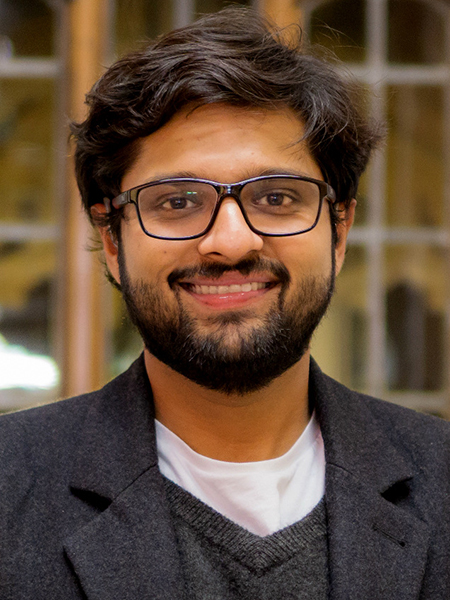SIGCHI, the Association for Computing Machinery’s Special Interest Group on Computer-Human Interaction, has honored four researchers with ties to the University of Washington with 2023 SIGCHI Awards. Allen School alum Nicola (Nicki) Dell (Ph.D., ‘15), a leader in applying technologies to safeguard victims of technology-enabled intimate partner violence (IPV), received a Societal Impact Award, while Dhruv (DJ) Jain (Ph.D., ‘22), received an Outstanding Dissertation Award for his work on technologies to enhance sound awareness for people who are deaf or hard of hearing. In addition, Megan Hofmann, a visiting Ph.D. student at the UW who taught at the Allen School, and Kai Lukoff, a recent alum of the UW Department of Human-Centered Design & Engineering, also received Outstanding Dissertation Awards — a testament to the UW’s far-reaching impact on human-computer interaction (HCI) education and research through its Design Use Build (DUB) group.
Dell’s work seeks to understand, build and deploy sociotechnical systems that benefit those who are underserved both in the United States and in resource-constrained regions of the world. She draws from qualitative and quantitative methodologies and engages with people in real-world settings as well as in academia, industry, government and non-governmental organizations. At the Allen School, Dell collaborated with the late professor Gaetano Borriello and professors Richard Anderson and Linda Shapiro on research that combines HCI, Information and Communication Technologies for Development (ICTD) and computer vision and machine learning, such as mobile camera-based systems to advance data collection and disease diagnosis in low-resource settings.
“Nicki’s work has always looked at the impact of digital technology on marginalized populations,” noted Anderson. “As a graduate student, she pioneered mobile applications in global health in domains such as rapid diagnostics and digitized data collection. She has now established herself as a leading researcher understanding the way that digital technologies tie into very sensitive situations, such as intimate partner violence. I am thrilled that her work is recognized by SIGCHI as she is highly deserving of the award.”
Upon graduation from the UW, Dell joined the faculty of the Jacobs Technion-Cornell Institute at Cornell Tech and the Department of Information Science at Cornell University. There, her efforts to improve digital safety and security for those who have experienced IPV have resulted in greater support for individuals affected by IPV and impacted both policy and legal discourse. In 2018, Dell and her Cornell colleague Thomas Ristenpart co-founded the Clinic to End Tech Abuse (CETA), whose mission is to address targeted attacks emanating from technology abuse.
“Everyone should be free to use technology without fear of harm from abusive partners or others,” said Dell. “Survivors of abuse, stalking, or other mistreatment should have the support they need to keep themselves safe online and on their devices.”
Dell endeavors to understand both how survivors can stay safe and how abusers misuse technology. In 2017, she and Ristenpart undertook the initial research that would form the foundation on which they built CETA. Their paper, “A Stalker’s Paradise”: How Intimate Partner Abusers Exploit Technology, which won a Best Paper Award at SIGCHI 2018, described their findings from qualitative interviews conducted in New York City with those who had experienced technology enabled IPV. Their findings underscored how abusers threaten, harass, intimidate, monitor and harm victims by interacting with and compromising the victims accounts or devices through adversarial authentication. The authentication is often obtained as a result of the closeness between victim and abuser, but also through coercion, threats and violence. Dell’s subsequent work has explored care infrastructure for digital security in IPV to understand security support for those who have experienced technology enabled IPV as well as narrative justifications of intimate partner surveillance and tools and tactics of IPV through analyses of online forums.
Operating in New York City since 2018, CETA works directly with survivors of IPV to determine if someone is using technology to harm them and what they can do to stay safe. In parallel, CETA facilitates new research to understand how abusers can misuse technology, advocates for laws and policies that include better protections from technology abuse, and publishes resources for others who work to help survivors. At this time, their work has influenced legislation both in New York State and at the federal level. In December 2022, President Biden signed the Safe Connections Act into law. This legislation supports survivors’ requests to have themselves or those in their care removed from shared phone plans while retaining their phone numbers for uninterrupted connectivity. Other proposed legislation would require cellular providers to create strong privacy protection with regard to information about abuse, to eliminate difficult or trauma producing requirements for survivors, and to train employees about survivors’ rights.
“[Dell’s] work is exemplary in many regards, representing an unusually ‘full stack’ model of intervention and social impact,” wrote Neha Kumar, president of SIGCHI and a professor at the Georgia Institute of Technology, in the award announcement. “She has been the driving force in putting tech-related IPV abuses on the radar of companies, government, and HCI as a field; has offered direct and meaningful support to survivors; and has produced real-world changes that have begun to combat this pervasive and insidious problem.”
Dell is one of three recipients of this year’s SIGCHI Societal Impact Awards, including Shaowen Bardzell, a professor at Pennsylvania State University, and Munmun De Choudhury, a professor at the Georgia Institute of Technology.
SIGCHI honored Jain, who completed his Ph.D. working with Allen School professor Jon Froehlich and HCDE professor and Allen School adjunct faculty member Leah Findlater, for his dissertation, “Sound Sensing and Feedback Techniques for Deaf and Hard and Hearing People.” That work, which was supported by a Microsoft Dissertation Research Grant and a Google CMD-IT LEAP Alliance Fellowship, focused on the design and evaluation of interactive systems to improve sound awareness for those who are deaf and hard of hearing (DHH).
Jain takes a user centered approach to better understand sound awareness, sensing and technology preferences and needs of those who are DHH. After first evaluating the needs and preferences of those who are DHH, Jain employed an iterative approach in both the lab and the field to design, build and evaluate new systems that could support real-time sound recognition — informed in part by his own experiences as a DHH individual.
“Dhruv’s dissertation exemplifies the use of end-to-end human-centered research to define and advance methods and tools for real-time sound recognition,” Froehlich expressed. “Fundamentally, his work advances our understanding of DHH people’s needs around sound recognition and provides technical solutions to support those needs.”
Jain’s research led him to develop several such systems, including HoloSound, an augmented reality (AR) system that allows DHH individuals to receive a classification and visualization of sound along with speech transcription. Another project, HomeSound, explored how DHH people relate to sounds in the home, how they solicit and relate to feedback from home awareness systems, and what concerns arise with the use of these systems. Jain also developed a smartwatch app called SoundWatch that alerts people who are DHH to sounds in their environment.
Currently a professor at the University of Michigan, Jain builds on the research agenda that he developed during his Ph.D. work. He directs the Accessibility Lab, where he and his collaborators take a user-centered approach with the goal to make sound accessible to all people in all settings. Before the SIGCHI award, Jain received the Allen School’s William Chan Memorial Dissertation Award, which honors graduate dissertations of exceptional merit and is named in memory of the late graduate student William Chan.
For her award-winning dissertation, “Optimizing Medical Making,” Hofmann worked with professor Jennifer Mankoff, who joined the Allen School faculty from CMU, on an interdisciplinary approach to the application of digital fabrication in health care. Combining programming languages, systems and ethnographic methodology, Hofmann introduces new ways that digital fabrication can be a tool to design assistive and medical devices informed by the domain expertise of people with disabilities and the medical knowledge of clinicians. This groundbreaking work has already had real-world influence in the application of clinical review processes to the production of personal protective equipment (PPE) during the COVID-19 pandemic.
Hofmann is now a professor at Khoury College of Computer Sciences at Northeastern University, where she directs the Accessible Creative Technologies (ACT) Lab. While at the UW, Hofmann taught the Allen School’s e-textiles course and was a member of the Make4all Group and Center for Research and Education on Accessible Technology and Experiences (CREATE).
The third UW-affiliated researcher to earn an Outstanding Dissertation Award, Lukoff explores the concept of user agency in a world where application design patterns strive to capture user attention, often without regard for the user’s well-being. His dissertation, “Designing to Support Sense of Agency for Time Spent on Digital Interfaces,” co-advised by HCDE professor and Allen School adjunct faculty member Sean Munson and Information School professor and Allen School adjunct faculty member Alexis Hiniker, goes beyond the concept of “screen time” to offer insights into how users’ experiences with digital interfaces can be meaningful or meaningless depending on the context and goals. Lukoff built a mobile app, SwitchTube, to investigate design features that allowed users a greater sense of agency when consuming online video content. He continues to build upon this line of inquiry at Santa Clara University, where he is a professor and director of the Human-Computer Interaction Lab.
Congratulations to this year’s SIGCHI award recipients!




